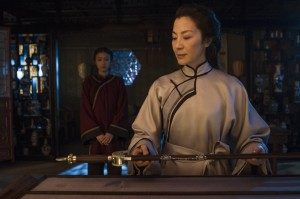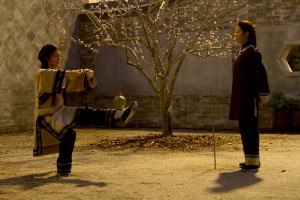By: Izumi Hasegawa March 1, 2016
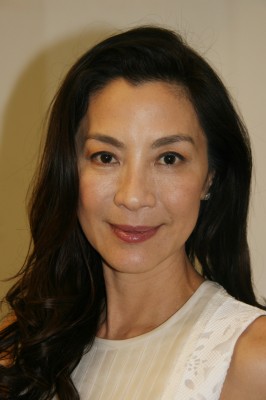
In every journalist career, there are certain moments that stand out; and for me having the opportunity to sit down for an exclusive interview with my favorite Asian actress, Michelle Yeoh, was an honor and simply amazing. Let’s start with Police Story 3, one of my favorite action films of all time and Michelle co-stars in with Jackie Chan. The choreography of her action scenes are very sharp yet elegant. In Memoirs of a Geisha, she was the only non-Japanese actress in the film that nailed the movement of Geisha, which were beautiful and smooth. In her new film, Crouching Tiger, Hidden Dragon: Sword of Destiny the smoothness in her moves graduate to a more purposeful martial arts vibe. Find out in this exclusive interview how she transitioned her action scenes and if she is similar to her character in handling romance. Also, Michelle shares her experiences of being an Asian woman married to a French man.
Q: The action scenes in your films are performed with such beauty, elegance, and a perfected smoothness. They all seem to have your signature movements in every film. I understand you come from a dancing background, but are there other things you do to prepare and make these scenes so different while still feeling so similar in their perfection for the audience?
I think it’s the nuances. The little details that you normally think, “Ah that’s so small. Nobody would notice.” I think it’s the little nuances that really makes the difference. But coming from a dance background, from ballet, and then learning the martial arts, I think the most important thing is I embrace the differences. And so, to be able to is very important because every single one has it’s own nuances. So, to be able to project them. It just takes a little bit more time.
Q: What would be an example of how those “little nuances” helped or changed how you approached a character?
For example, in this particular movie this character, you’ve seen her before–16 years ago, you know? When she was yonger. She’s very heroic. She’s not afraid. She’s very bold. She’s out there. She’ll fight to the death for her people. She’ll protect her family and friends. But then, for example, I wanted to show the difference. Because now is seventeen years later. When you see her she is very Zen. Before when she comes up she’s very [makes action movement]. But now when she comes out she’s very God – much more peaceful. And I need to project that because she has moved on. She has now moved to an enlightened state where she lives by herself. She lives by the mountains. She’s able to meditate. She’s able to practice martial arts and take it to another level where it’s not just about fighting, but it’s for inner peace and well being. It’s very important that you see the difference right away. When she comes out she’s much more Zen. She’s a great warrior. That’s without doubt. Because her movements–this time everything is much more contained because she’s a teacher now. She’s a master, right? Teaching is not just about the action. It’s about the focus. it’s about understanding the problem. And then only you can solve the problem. It’s not about bringing out the sword and just going, “Wah wah wah wah wah!” Anybody can do that. In fact, they all do that, but the thing is you will lose, and you will lose your life if you don’t know how to control that. So, for me it’s taking her another level of Zen.
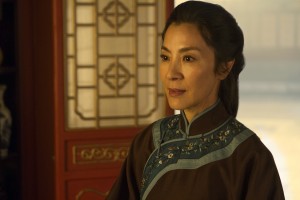 Q: Your character’s has a very complicated romance. What would you say is different on how you are in a romantic relationship?
Q: Your character’s has a very complicated romance. What would you say is different on how you are in a romantic relationship?
I’m much more modern. Much more independent. I think in this day and age we are much more vocal about how we feel and all that, but sometimes I think that some things are better not said. But I think mutual respect and love comes with communication, and comes with understanding, and comes with accepting the other person for who they are.
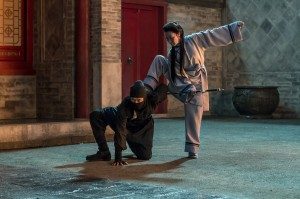 Q: What is the most gratifying part of being an Asian woman?
Q: What is the most gratifying part of being an Asian woman?
I think the pride. The elegance of inner beauty. I think for me, with Asians, they are not so quick to allow you to understand what they feel inside. Not because they are afraid to do that. I think they value their privacy. Without having to demonstrate in big ways or flamboyant ways, or big proclamations of love. I think with Asians. I think with Japanese or Chinese or Koreans, we don’t say, “Oh, I love you. I love everybody!” And you’re going, “Wow you really throw love all over the place. What kind of lover are you talking about?” Then what happens? I think for us we value–in a different way, we look at loyalty, we look at filial piety, and family, to parents, to elders, in a much more controlled and quiet dignity.
 Q: You have lived in different countries and are married to Frenchman, Jean Todt who lived in Paris; where do you both live now?
Q: You have lived in different countries and are married to Frenchman, Jean Todt who lived in Paris; where do you both live now?
We live between Paris and Geneva. He’s a Swiss resident, but his offices are in Geneva and Paris. My family is in Malaysia. And then when I work, it’s from Hong Kong.
Q: With you being raised Malaysian and Jean being raised French, is the culture gap difficult to deal with?
I think because ever since I was very young my parents had taught us to be very accepting of different cultures. I think the interesting thing about Malaysia is we are a very multi-racial society. So, we never see how cultures separate people. We see how they are different. But at the same time we accept. And we live together very harmoniously. So, it’s always been very easy for me to go to another country and enjoy the differences in the culture and at the same time enjoy the culture for what it is. So, I don’t have a problem when I got to England to live or I go to America. Or I go to Australia. Or even Japan or something. Sometimes with the language it’s more difficult, but to enjoy being in a different environment is something that I look forward to.
 Q: Do you have any funny culture gap experience, like food or customs?
Q: Do you have any funny culture gap experience, like food or customs?
Never with food because I’m very adventurous when it comes to food. This is something my father always taught us. You always try everything. If you don’t like it, then at least you tried and you know you don’t like it. You know, eating weird foods, especially in Japan when you go. Something funny– you know, when you go to a Sushi bar and they bring out all the live things? I think the first time I had the experience of the octopus, when they bring it out and it goes [wild noise]. They throw it down [wild noise]. And then the octopus is like, “Bleh.” And you’re going, “Okay.” And slowly the octopus is trying to crawl back. Oh my God. But that’s food.
Crouching Tiger, Hidden Dragon: Sword of Destiny is on IMAX theaters and Netflix.

